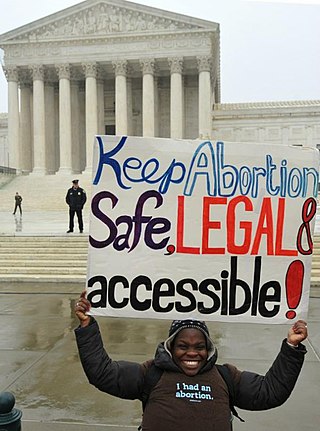Related Research Articles
Abortion is the termination of a pregnancy by removal or expulsion of an embryo or fetus. An abortion that occurs without intervention is known as a miscarriage or "spontaneous abortion"; these occur in approximately 30% to 40% of all pregnancies. When deliberate steps are taken to end a pregnancy, it is called an induced abortion, or less frequently "induced miscarriage". The unmodified word abortion generally refers to an induced abortion. The most common reasons women give for having an abortion are for birth-timing and limiting family size. Other reasons reported include maternal health, an inability to afford a child, domestic violence, lack of support, feeling they are too young, wishing to complete education or advance a career, and not being able or willing to raise a child conceived as a result of rape or incest.

Sex-selective abortion is the practice of terminating a pregnancy based upon the predicted sex of the infant. The selective abortion of female fetuses is most common where male children are valued over female children, especially in parts of East Asia and South Asia, as well as in the Caucasus, Western Balkans, and to a lesser extent North America. Based on the third National Family and Health Survey, results showed that if both partners, mother and father, or just the father, preferred male children, sex-selective abortion was more common. In cases where only the mother prefers sons, this is likely to result in sex-selective neglect in which the child is not likely to survive past infancy.

Family planning is the consideration of the number of children a person wishes to have, including the choice to have no children, and the age at which they wish to have them. Things that may play a role on family planning decisions include marital situation, career or work considerations, financial situations. If sexually active, family planning may involve the use of contraception and other techniques to control the timing of reproduction.
Reproductive rights are legal rights and freedoms relating to reproduction and reproductive health that vary amongst countries around the world. The World Health Organization defines reproductive rights as follows:
Reproductive rights rest on the recognition of the basic right of all couples and individuals to decide freely and responsibly the number, spacing and timing of their children and to have the information and means to do so, and the right to attain the highest standard of sexual and reproductive health. They also include the right of all to make decisions concerning reproduction free of discrimination, coercion and violence.

Sexual and reproductive health (SRH) is a field of research, health care, and social activism that explores the health of an individual's reproductive system and sexual well-being during all stages of their life. Sexual and reproductive health is more commonly defined as sexual and reproductive health and rights, to encompass individual agency to make choices about their sexual and reproductive lives.
Abortion in the Czech Republic is legally allowed up to 12 weeks of pregnancy, with medical indications up to 24 weeks of pregnancy, in case of grave problems with the fetus at any time. Those performed for medical indications are covered by public health insurance, but otherwise, abortion is relatively affordable in the Czech Republic. In Czech, induced abortion is referred to as interrupce or umělé přerušení těhotenství, often colloquially potrat ("miscarriage").
Abortion in Iran, as can be expected of many government policies, changed drastically between governments.

Reproductive justice is a critical feminist framework that was invented as a response to United States reproductive politics. The three core values of reproductive justice are the right to have a child, the right to not have a child, and the right to parent a child or children in safe and healthy environments. The framework moves women's reproductive rights past a legal and political debate to incorporate the economic, social, and health factors that impact women's reproductive choices and decision-making ability.
Unintended pregnancies are pregnancies that are mistimed or unwanted at the time of conception, also known as unplanned pregnancies.
Abortion in China is legal at all stages of pregnancy and generally accessible nationwide. Abortions are available to most women through China's family planning program, public hospitals, private hospitals, and clinics nationwide. China was one of the first developing countries to permit abortion when the pregnant woman's health was at risk and make it easily accessible under these circumstances in the 1950s. Following the Chinese Communist Revolution and the proclamation of the People's Republic of China in 1949, the country has periodically switched between more restrictive abortion policies to more liberal abortion policies and reversals. Abortion regulations may vary depending on the rules of the province. In an effort to curb sex-selective abortion, Jiangxi and Guizhou restrict non-medically necessary abortions after 14 weeks of pregnancy, while throughout most of China elective abortions are legal after 14 weeks. Although sex-selective abortions are illegal nationwide, they were previously commonplace, leading to a sex-ratio imbalance in China which still exists.

The Center for Reproductive Rights (CRR) is a global legal advocacy organization, headquartered in New York City, that seeks to advance reproductive rights, such as abortion. The organization's stated mission is to "use the law to advance reproductive freedom as a fundamental human right that all governments are legally obligated to protect, respect, and fulfill." Founded by Janet Benshoof in 1992, its original name was the Center for Reproductive Law and Policy.
Abortion in Armenia is legal on request up to 12 weeks of pregnancy, and in special circumstances between 12 weeks and 22 weeks. Abortion has been legal since 23 November 1955, when Armenia was a republic of the Soviet Union. Pregnancies may be ended on request by the pregnant woman until the twelfth week and for medical and social reasons until the twenty-second week with a doctor's approval. Since 2016, when a law banning sex-selective abortion was passed, mandatory counseling is required before abortion along with a three-day waiting period. The law has been criticized as using sex-selective abortion as a pretext to restrict access to abortion, although the government denied this, and claimed that it did not intend to question women's right to access safe abortion.
Abortion in Serbia was legalized in its current form on October 7, 1977. Abortion on demand is available for women whose pregnancies have not exceeded the tenth week, and in the case of risk to life or health of woman, or when the pregnancy has resulted from a sex offence, or in case of fetal impairment up to twenty weeks. Minors under 16 require parental consent before undergoing an abortion.

Access to safe and adequate sexual and reproductive healthcare constitutes part of the Universal Declaration of Human Rights, as upheld by the United Nations.

Abortion in Ukraine is legal on request during the first twelve weeks of pregnancy. Between 12 and 28 weeks, abortion is available on a variety of grounds, including medical, social and personal grounds, and for any reason with the approval of a commission of physicians. Oral contraception is available over-the-counter without a prescription and the morning after pill is also readily available.
Women's reproductive health in Russia refers to the set of physical, mental, and social health issues and services available to women in Russia. It includes the rights, laws, and problems experienced by women and their families regarding proper reproductive health. Women account for over half of the Russian population and are considered a vulnerable population due to political and social problems from inequalities in gender, age, socioeconomic status, and geographical location that affect access to comprehensive health care. As Russia struggles with a decreasing birthrate and increase in STIs, HIV, and poor reproductive health care, the need for government financed services and international programs is essential to successfully reach this vulnerable population. Currently, women in Russia access care through government funded free services, private insurance, and NGO programs.
Abortion in Uganda is illegal unless performed by a licensed medical doctor in a situation where the woman's life is deemed to be at risk.
Abortion in Kazakhstan is legal as an elective procedure up to 12 weeks, and special circumstances afterwards. The relevant legislation is based on the laws inherited from the country's Soviet past, when abortion was legally permitted as a contraceptive.

Secularism in Georgia was most popular in the 20th century when the country was part of the Soviet Union. In the 21st century, secular and non-religious currents have seen a precipitous decline due to the rising number of people practicing the Georgian Orthodox Church. Article 9 of the current Constitution of Georgia provides for complete freedom of belief and religion. It also recognizes the "special role ... in the history of Georgia" of the Georgian Orthodox Church, but stipulates that the GOC shall be independent of the state. A special Concordat between the Georgian state and the GOC was ratified in 2002, giving the GOC a special legal status and rights not given to other religious groups—including legal immunity for the Georgian Orthodox Patriarch, exemption from military service for GOC clergy, and a consultative role in education and other aspects of the government.
In 2005, the Ethiopian Parliament liberalised the abortion law to grant safe abortions to women in specific circumstances.
References
- ↑ "Law 21 July 2000". 2000. Retrieved 11 December 2016.
- ↑ International Planned Parenthood Foundation European Network (January 2009). Abortion Legislation in Europe (PDF) (Report). p. 30. Retrieved 12 December 2016.
- ↑ "Georgia". Abortion Policies: A Global Review (DOC). Vol. 2. United Nations Population Division. 2002. Retrieved 29 January 2017.
- ↑ "World Abortion Policies 2007". United Nations. 2007. Retrieved 12 December 2016.
- ↑ Serbanescu, Florina; Stupp, Paul; Westoff, Charles (June 2010). "Contraception Matters: Two Approaches to Analyzing Evidence of the Abortion Decline in Georgia". International Perspectives on Sexual and Reproductive Health. 36 (2): 99–110. doi: 10.1363/33609910 . JSTOR 27821036. PMID 20663746.
- 1 2 Edwards, Haley Sweetland (20 July 2012). "From Abortion to Contraception". Latitude. The New York Times. Retrieved 10 February 2018.
- ↑ "World Abortion Policies 2013". United Nations. 2013. Retrieved 12 December 2016.
- ↑ "Caucasus Barometer 2013 Georgia: Always justified/never justified: Having an abortion". Caucasus Barometer. The Caucasus Research Resource Centers . Retrieved 10 February 2018.
- ↑ "Social views and morality". Religious Belief and National Belonging in Central and Eastern Europe (Report). Pew Research Center. 10 May 2017. Retrieved 10 February 2018.
- ↑ Michael, Marc; King, Lawrence; Guo, Liang; McKee, Martin; Richardson, Erica; Stuckler, David (2013). "The Mystery of Missing Female Children in the Caucasus: An Analysis of Sex Ratios by Birth Order". International Perspectives on Sexual and Reproductive Health. 39 (2): 97–102. doi: 10.1363/3909713 . PMID 23895886.